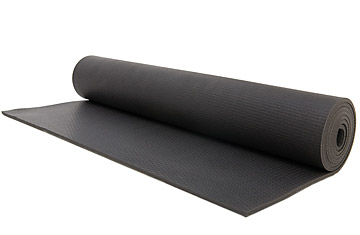
Manduka's Black Mat PRO
It's no secret that luxury has taken a beating in the Great Recession. High-end restaurants are hurting as people trade the $30 Steak for the $3 Big Mac. Saks Inc. lost $5.1 million in the first quarter of '09, a 129% drop from the previous year. Necessity is the new luxury.
But at least one surprising product is bucking the trend. At a time when consumers are in a serious saving mode, why are sales of $100 yoga mats soaring?
That's right — $100 for a stinkin' mat. A company called Manduka, which makes these luxury yoga props, has seen its sales rise 55% in the first four months of 2009. Sales at Amazon.com during this period are up a stunning 87%, and the company just signed a deal with Dick's Sporting Goods, a major retailer with 389 stores across the country. Manduka offers the Black Mat PRO, a thick, cushiony black mat, for between $74 and $130, depending on its length, and the biodegradable eKO for between $42 and $70. "Manduka is the Porsche, the Ferrari of yoga mats," says Phil Swain, CEO of YogaWorks, a 22-store chain of studios and retail shops in California (the company is opening a New York City location this summer). (See pictures of facial yoga.)
But these days, isn't driving a Toyota Corolla just fine? Yoga involves stretching, holding poses and doing other physical movement. We're not talking cushions for backflips here. When it comes down to it, can't you just do yoga on your carpet? Or grab a towel? Or pay for a $30 mat in the store?
According to the yogis, the thick black Manduka mat makes a real difference. First off, you're paying for superior traction. "When you sweat during yoga, it's easy to slip and slide," says Dayna Macy, a managing editor for Yoga Journal, a trade publication. "You don't slip with the Manduka." Also, the mat's extra cushioning softens the stress on your joints. "If you practice vigorously, you'll be moving up and down a lot, and you'll use your knees," says Macy. "The mat is comfortable. And when you feel what's under your feet, it can be a distraction." (Watch a video about fitness gadgets.)
The popularity of pricey mats reflects a spike in yoga practice. Participants in the activity grew from 4.3 million to 12 million between 2001 and 2008, according to a recent study. Of the 12 million people who reported doing yoga in the past six months, nearly one million said they were trying it for the first time. Since the recession went from painful to disastrous in September 2008, yoga studios throughout the country have reported increased traffic. Irene Narissi, a New York City yoga instructor, says her business has jumped 10% to 15% over the past seven months. The feedback from new clients: they are either unemployed and want to maintain their mental health or insecure about their current job status and want to maintain their mental health. "The meditative aspects of yoga," Narissi says, "satisfy the need to chill out."
Still, why are these insecure new consumers paying so much for their props? A closer look at the yogi demographics, however, offers clues into purchasing behavior. Yoga practitioners no longer fit the stereotype of weird women chanting the Hare Krishna mantra. They're young: 40.6% of those who do yoga are between 18 and 34, according to a 2008 Harris Interactive poll commissioned by Yoga Journal. They're smart: 71.4% are college graduates, and 27% have postgraduate degrees. And they're affluent: 44% of yogis have household incomes of $75,000 or more (that figure, of course, might be trickling down during the recession). In other words, yogis are yuppies. And if there's one thing yuppies do, it's copycat their brethren. So as more stressed-out young professionals flood the yoga studios and see other people with comfy Manduka mats supporting their glutes, they're bound to buy the pricey products too. Look at me: I've got a Manduka; I'm totally into yoga. (Watch TIME's video "Joel Stein: Acrobat Yogi.")
Also, it's easier to justify a $100 yoga mat than a lot of other expenses. "With hedonic consumption, at some point you're going to feel quite a bit of guilt," says C.W. Park, a marketing professor at USC's Marshall School of Business and editor of the Journal of Consumer Psychology. "If the luxury item has some kind of functional value, you're not going to feel that guilt." You feel like you're investing in your health, so a little splurge can't hurt. Plus, Manduka mats carry a lifetime guarantee. If the mat lives up to its promise, you may even save some money in the long run.
Not that there's anything wrong with that towel.
